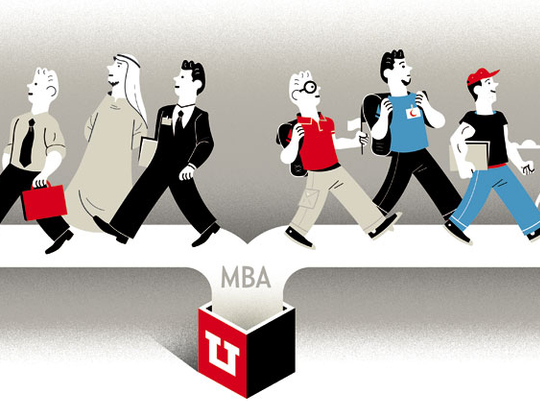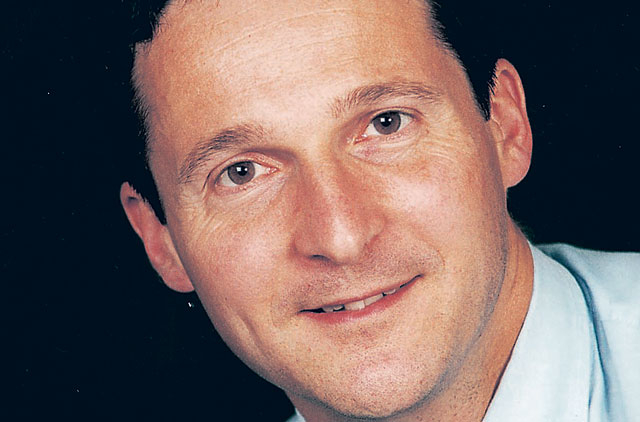
It is a gloomy time for MBA graduates worldwide. Salaries are lower, high- flying positions are not widely available and the job search is taking longer these days. And yet universities are flooded with MBA applications at the moment.
After the dust has settled since the corporate scandals and economic turmoil, today's MBA graduates and students are re-evaluating their positions in terms of careers and salaries. These days they are seeking to uplift their communities, socially responsible companies and a good work/life balance.
Make no mistake, MBAs are still getting good job offers and have fared much better than those with other professional qualifications, however they understand that they don't have the choice they once had, experts say.
New generation MBAs
"Despite salaries being high in controversial industries — such as oil, defence, tobacco — MBAs are increasingly taking an ethical standpoint and making a conscious decision to avoid working for such companies," said Nunzio Quacquarelli, Editor of TopMBA.com and Director of the QS World MBA Tour.
Dr David Van Over, Dean of the Faculty of Business and Management at the University of Wollongong in Dubai (UOWD) agrees. "When people stop making money or it's reduced, they become more concerned with security or quality of life." He said students are currently looking at potential employers with whom they can work for a long time.
According to TopMBA.com research, there has been an increase in the number of applicants wanting to work for charities, non- governmental organisations (NGOs) or in sustainability.
Quacquarelli explained that there has been a loss of faith in large financial institutions due to the recession though it is expected that MBAs will move into these roles as they become available again post-recession. However, these MBAs will look to bring corporate governance and ethical finance to the companies they join.
"There is clear evidence of a movement away from the ‘me-too' generation and towards a more inclusive, sustainable and perhaps ethical standpoint."
But money is still a factor, experts said. "Everyone is ambitious but it's the goals MBAs set for themselves. People are now looking to get the most out of their professional life," said Chris Jeffery, Executive MBA Course Director at Cass Business School, which has a campus in Dubai. "But whether you work for an NGO, business or government, you still have stakeholders, resources to manage and you still have to lead," he added.
"MBA graduates are clearly motivated by issues other than mere salary than ever before. They see work environment, work/life balance, international opportunities and other aspects of their careers as equally important," said Quacquarelli.
Fees
The cost of MBAs increased in 2008 in a way that it was impossible for some people to pursue an MBA said Shirin Jarrar, Director of the MBA programme at Edinburgh Business School's Dubai campus.
"It was easy for these schools to give out scholarships and discounts because they were already inflated. In 2009 the fees normalised."
Jarrar said there are many more players in the UAE market which is reaching saturation point. There are large and reputable business schools in the country which gives students many options. "So it is now student powered and they have more choice than when we started four years ago." In general fees have not drastically increased, said Quacquarelli. "Business schools are businesses themselves and competition is high, so there's been a sensible approach to fees structure."
For a standard two-year full time MBA in the US you can expect to pay $49,020 (Dh179,903) per year. With travel, books and living costs, an annual budget of $80,000 is recommended, according to Quacquarelli.
In Europe, the London Business School (LBS) is one of the rare institutions to offer a two-year programme, costing £45,500. European MBAs are usually shorter. The INSEAD MBA runs for ten and a half months and costs 51,000 euros, whilst the 18-month MBA at Manchester Business School costs £34,500.
Randa Bessiso, Director of the Middle East branch of the Manchester Business School Worldwide says the school is still increasing fees by about £1,000 every year. "It costs £23,000 this year."
"We are not decreasing fees but we are offering value added benefits such as being flexible about which centres our students go for classes."
Financing an MBA degree
Loan providers across the world withdrew from the student loan market during the recession. But "the worst has come when it comes to the recession. Banks will offer a loan if the student's profile is strong enough," said Jarrar.
"It's a psychological thing — business is picking up and banks are ready to spend and so are students. In this case, many of our students look at an MBA as an investment of their time and money," she said.
However, companies are still not keen to sponsor their employees for MBAs. "It used to be very popular," said Jarrar. "I think we will see an improvement in the summer."
Quacquarelli said although most MBA applicants will try to seek out scholarships, the reality is that the majority will resort to loan financing, supplemented by personal savings or family savings. And new products are becoming available.
Jeffery cautions that there is a misnomer that students can go abroad and easily get a loan from the host country. "Very few organisations will fund them as there is no guarantee they will get their loan back."
He said CBS had a number of loan packages but students had to be a good credit risk.
He said students were clearly in need of funding as there has been an increase in requests for scholarships and studentships, "which we are happy about. We want to attract and support the best people".
He said now was a good time to do an MBA with an international school if you are based in the UAE. "Financially it's the best time if you're based in the region — it will cost you less in your local currency."
He said people are now investing in their own future within the workplace than relying on the corporation to fund and develop their own career.
Bessiso agrees that there has been a relatively weak response from companies to sponsor students for MBAs. "Now they still offer support by being flexible about working hours but not in cash."
Although things are not as rosy as before, "the MBA hiring picture internationally is far from gloomy," said Quacquarelli.
He said MBAs are generally out- performing other professional qualifications in terms of employment rates. "In 2009, at the height of the crisis, MBAs still reported [that] an average of 85 per cent of graduates had employment within three months of graduation."
MBA salaries did not grow last year, but there was also little evidence of a fall in salaries, even within financial services he said.
The demand for MBAs is high this year and "the UAE is likely to rebound quite strongly over the next three years, if not sooner", Quacquarelli said.
He said the region is committed to becoming a knowledge-based economy, with governments in Dubai, Abu Dhabi and Saudi Arabia investing heavily in higher education and MBA education. "The huge resources available for investment mean that local MBA educational infrastructure and supply is probably increasing more rapidly than any other countries in the world today, apart from China and India."
Quacquarelli believes it would be beneficial for local managers to gain an international perspective and to study abroad and then return with the new skills and cultural insights gained from an international MBA.
Van Over agrees upper end jobs have not been widely available as the industry is still hesitant. "Dubai wasn't hit as hard and won't come back as fast. It's is not one of the big centres of the financial world — those that were hit harder recover faster."
He said students and graduates from UOWD realise there is more to a job than a paycheque, people are still motivated by money. "Although lots of colleagues are telling me that students are demanding more from their employers.
Graduate feedback
Sudanese national Dina Rahman who is currently pursuing an executive MBA student at London Business School as part of the Dubai cohort said students have become very "sophisticated and demanding of our employers. It's not just any job — it's the right job with the right work/life balance, motivation and training opportunities."
She said job advertisements are also more detailed and mention that they are socially responsible.
As for the job search, it has been difficult for her peers she said. Although LBS has offered networking opportunities and assistance with interviews, the search has been longer than it was before. Dina said she knows some in her class have taken "less prestigious positions" to pay off student loans.
Leslie Farnworth who graduated from the UOWD said companies were also looking for more skilled managers over MBAs who only had a year or two of experience.
— With inputs from TopMBA.com writers
Explore your options at the QS MBA Tour
More than 30 of the world's top business schools will be attending the QS MBA Tour this week to give prospective students in the UAE a chance to meet their representatives. Visitors will be able to meet face-to-face with the MBA admissions officers and alumni from top business schools, attend GMAT and an admissions strategy workshop and apply for a range of exclusive scholarships worth more than $1,600,000 at the event. The first 100 visitors will receive a complimentary copy of the QS TopExecEd Guide featuring editorial and profiles of Executive MBA programmes from around the world.
DATE: April 21TIME: 5-9pm. Registration starts at 3.30pm. VENUE: Crowne Plaza Dubai, Shaikh Zayed RoadFOR MORE INFORMATION: Visit www.topmba.com/mba_fairs/













